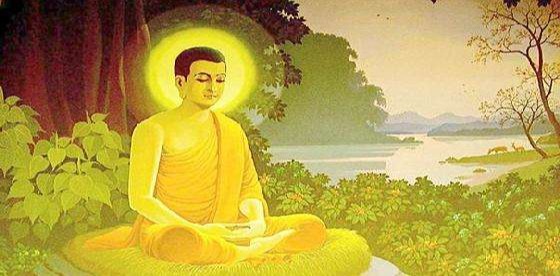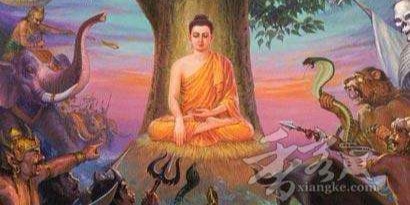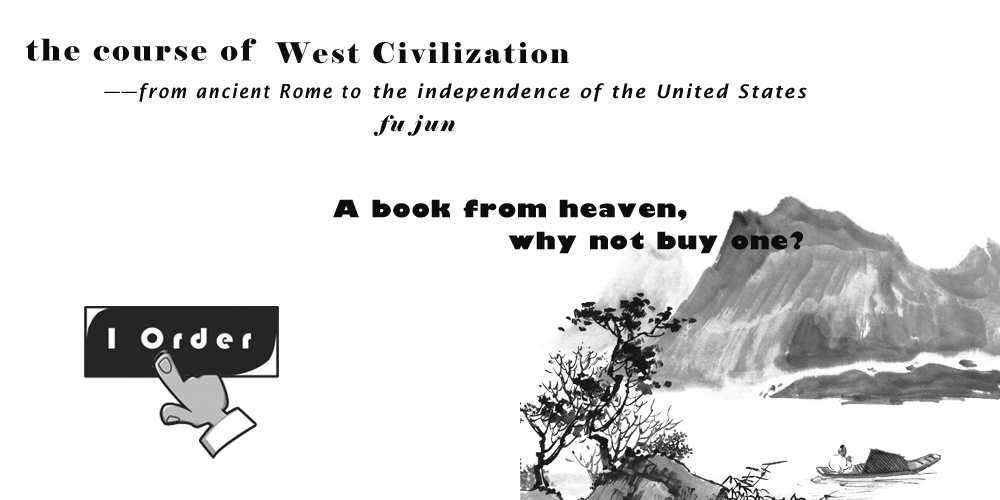、烦恼,生而悲剧(中英文版)
第一部.总论与英国革前
第一章.宗教与人生
第三节.贪婪堕落的人性
我们人生而有无穷尽的痛苦(中英文版)

我们人,生而烦扰、痛苦,无往而不在于烦扰、痛苦之中。
人生是痛苦的,对于这点释迦牟尼的认识最为清晰明澈,他认为人生有八苦,生、老、病、死、怨憎会、求不得、爱别离、五阴炽盛,这样论述已经够详尽了,可依然无法穷尽人生的烦恼、痛苦。年轻时读弗洛伊德的《梦的解释》,看完之后目瞪口呆,人类原来还有如此之多莫名其妙的烦恼、痛苦,如此之多闻所未闻的心理障碍,这个戴着圆边眼镜目光犀利的老头,将人类的精神世界赤裸裸地呈现出来。他认为这些烦扰痛苦是潜意识中的愿望无法实现造成的,他试图通过对梦的解释,缓解潜意识与现实之间的冲突,释放精神上的压力减轻痛苦烦扰,可是实践证明这并不是一个有效的方法。我们无可否认弗洛伊德是一位伟大的心理学家甚至哲学家,他直面我们人生的烦扰、痛苦,精神分析学这个冷门学科从此成为主流文化常青的话题,不正说明烦扰痛苦正是人类的本质而引起前所未有的共鸣吗?精神分析学在心理学领域的影响远没有在思想与艺术领域来得大,因为心理学认为自己是门科学,而科学是需要实验重复验证的,其他心理学派总是通过重复实验来检验自己的观点,而这恰恰是弗洛伊德的精神分析学无法做到的,精神分析学说在心理学界被认为是臆想猜测也就不足为奇了。但是弗洛伊德的伟大不在于心理学上,而是在哲学上,他在叔本华的基础上,以心理学为依据从更经验的角度论述人类烦扰、痛苦的本质,这才是弗洛伊德的真正价值所在。人类的真实世界原来根本就不是我们通常所认为的,理性世界,宁静、平和的世界,而是处于无穷无尽的烦扰痛苦之中,是非理性的,弗洛伊德彻底打开了非理性这个潘多拉魔匣子,至此我们知道人类是非理性而不是理性的,非理性的浪潮一下子淹灭了人类的哲学界、思想界,在弗洛伊德的基础上大量非理性的哲学诞生了。从此,人类历史上所有理性、崇高的字眼都被无情地解构,国家、民族、宗教、爱情、永恒,所有这些都是虚幻的、苍白的,唯有自己的存在才是真实的,唯有自己的感觉才是存在的,这些思想又使人类更加疯狂地追求自己的存在、享乐。从某种意义上讲,弗洛伊德确实是打开了潘多拉的魔闸子,给人类带来更多的烦扰、痛苦。

欢迎前往购买《西方文明的历程》中英文版

我们总是在无穷无尽、此起彼伏的烦恼、痛苦之中,烦恼与痛苦就像影子一样紧随着我们怎么也甩不掉,有时是才下眉头却又上心头,这个烦恼才消除另一个烦恼随即又升起,有时是心有千千结,怎么都解不开,有时却恰如一江春水向东流,一发不可收拾,有时在你最得意的时候,它像小毒刺一般悄然扎进你心头,而且这种时候的痛苦总是更深刻,更令人难以消除。
电影《沉默的羔羊》中的莱特医生是一名优秀的精神病医生,但却是个变态食人魔,这种强烈的对比正是这部电影的噱头所在,也正是这部许多人认为毫无意义的电影蕴含的最大深意,是它获得奥斯卡金像奖的主要原因。让我们来猜测一番莱特医生的精神世界,作为精神病医生,一般层面上的精神痛苦对于他来说已经不算什么,他都可以合理解决释放,可是许多比一般层面更深刻,更难以释怀的痛苦又不断地涌现出来,使他深陷其中无法摆脱。同时他又接触了太多的精神病例,面对人类如此复杂紊乱的精神世界,作为一个精神病医生也终于无法承受彻底崩溃变态为一个食人魔。我们每个人自身就有太多的烦恼,是否承担得起别人的痛苦,这确实是个疑问,他可以精辟地剖析别人的心理,可他却无法拯救自己的灵魂。这部电影给我们最大的启示是,精神上的问题也许本来就不是人类的知识层面可以解决的,人类的精神领域的神秘、复杂、紊乱不是一般人可以承受的,对于我个人而言,我永远不会去从事心理学,精神病学这些职业。对于心理学家、精神病医生我保持着永远的敬意,我认为他们工作在比子弹纷飞的战场更危险的领域,他们在人类精神世界的探索也许会给人类带来真正的幸福,但却给自己造成巨大的伤害,巴顿充满诗意地说道,他愿牺牲在最后一场战斗的最后一颗子弹之下,可精神的煎熬折磨远比这瞬间的死亡恐怖百倍。



欢迎前往购买《西方文明的历程》中英文版



释迦牟尼认为我们人生的痛苦来源于我们沉浸于六根—眼、耳、鼻、舌、身、意这些感官带来的快感中,也就是无明。③六根为我们带来了声、色、味、美食、性、名誉等快感,这里我将‘身’产生的快感认定是性快感,因为除了眼、耳、鼻、舌外,身体上其他部位能强烈给我们带来快感的就是性器官了,至于‘意’,我个人认为世俗生活中名誉对人的诱惑力及危害最大,‘意’很明显就是指名誉。我们沉浸于这些快感中不能自拔,不能认识到人生的本质,生命的真谛。他认为可以通过了却尘缘的隐居,戒定惠的修行使六根清净、明心见性,证得无上觉悟,达到永生、永恒,脱离生死轮回的涅槃境界。通过这样的方法是否真的可以达到涅槃境界作为凡夫俗子的我实在无法评论,因为自己连一个‘戒’字都无法做到,又怎能体会修行的精深,佛教的博大。我们就暂且不把释迦牟尼当作佛教创始人,只将他作为一名思想家、哲学家,那么他对人类烦扰、痛苦的本质的论述是一针见血,入木三分的,可以说古往今来无人可及,他清楚地看到了人类沉浸于感官带来的快感中,并指出这些感官上的快感正是痛苦的根源,这些见解使我们豁然开朗,有如拨开云雾见天日,也说明了无论如何释迦牟尼都是一位伟大的思想家。
注:
①引用自《梦的解释》中国华侨出版社,弗洛依德著,朱更生译
②引用自《佛教哲学》中国人民大学出版社,方立天 著74页-80页
③引用自《佛教哲学》中国人民大学出版社,方立天 著280页-290页

年轻时痴迷于武侠小说,有一个武侠梦,跟着师傅,带着小师妹,行走江湖,浪迹天涯,看尽人生百态,笑纳人间风云,在师傅的呵斥,小师妹的嗔骂中渡过一天又一天。不过再怎样洒脱不羁也要生活,除了卖艺外武侠没有其他谋生手段,于是在繁华热闹的场所,总看到我们卖艺的身影。每次卖艺后最常说的一句话是,“各位大哥,大姐,有钱的捧个钱场,没钱的捧个人场”。钱场就是现在的打赏,人场就是转发。只是如今已是油腻的中年大叔,梦想虽在,但再也无法实现,只能寄托在网络上。于是文章就是我的武功,公众号平台就是卖艺场,每发一篇文章就是一次卖艺,每次卖完艺后都非常希望得到大家的打赏与转发,所以在这里向大家拱拱手说,“有钱的捧个钱场,没钱的捧个人场”。也许人生本是个轮回,在这里我也实现了前世卑微而又有点意思的武侠人生。
这是新的微信赞赏码,在这艰难时刻更需要大家的大力支持
这是针对全球所有微信,支付宝朋友的赞赏码,呈现是美元金额,
这是针对海外朋友的paypal赞赏号,欢迎大家通过这个帐号打赏
https://www.paypal.me/readjoyinc
religion determines the customs of human life, power of religion can be seen

We people are born with annoyance and suffering. We are not surrounded by bother and agony nowhere.
Life is suffering. Shakyamuni’s understanding of this is sharp and clear. He believes that there are eight sufferings in life: Birth, old age, illness, death, resentment and hatred, inability to seek, love but separation, and the prosperity of the five netherworlds. This discussion seems detailed enough but can’t exhaust life’s annoyance and suffering. I read Freud’s “interpretation of dreams “when I was young. I was stunned after reading it. Human beings had so many inexplicable bother and agony and so many unheard-of psychological obstacles. This eagle-eyed older man wearing round-rimmed glasses revealed the human spiritual world nakedly. He believed that unfulfilling subconscious wishes caused this annoyance and suffering. He tried to alleviate the conflict between the subconscious and reality by interpreting dreams, releasing mental pressure, and decreasing annoyance and suffering. Still, the practice has proved that this method is ineffective. We can’t deny that Freud is a great psychologist and even a great philosopher. He challenged the annoyance and suffering of our life. Since then, psychoanalysis, an unpopular subject, has become a perennial topic in mainstream culture. Doesn’t it just show that annoyance and suffering are the essence of humans and cause unprecedented resonance? Psychoanalysis has far less influence on psychology than thinking and art because psychology believes itself to be a science. However, science needs to test their views through repeated experiments; other psychological schools always practice that, only Freud’s psychoanalysis can’t. It is not surprising that psychoanalysis regards psychology as speculation. Freud’s greatness lies not in psychology but philosophy. On the basis of Schopenhauer, Freud discussed the human nature of annoyance and suffering from a more empirical perspective, which was the actual value of Freud. The real world of human beings is beyond quiet and peaceful, a rational world as we usually think of, but irrational, in endless annoyance and suffering. Freud completely opened Pandora’s magic box of irrationality. So far, we know that humans are irrational rather than rational. The wave of irrationality suddenly flooded the philosophical and ideological worlds, and many irrational philosophies were born based on Freud. Henceforth, human history’s rational and noble words have been ruthlessly deconstructed, including country, nation, religion, love, and eternity. All these are illusory and pale. Only humans’ own existence is real, and only humans’ own feelings exist. These thoughts make humans crazier to pursue their own existence and enjoyment. In a sense, Freud really opened Pandora’s magic gate and brought more annoyance and suffering to humans.

Welcome to https://www.amazon.com/dp/B0BQF77K3D to buy the Kindle ebook“the course of western civilization(essence version)”

We are always in an endless stream of annoyance and suffering. bother and agony seem like shadows of ourselves; we can’t eliminate them. One dispels, but another rises immediately. Sometimes we remove them under the brow, but they soon come up to the heart. Sometimes our hearts are in knots and can’t be unraveled. Sometimes our endless annoyance is just like spring waters flowing eastward, going on forever. Sometimes when you are riding high, they stealthily jab into your heart like a small poisonous thorn, and the pain at this time is always deeper and more difficult to cast off.
Dr. Wright in “the silent lamb” is an excellent psychiatrist, but he is a perverted ogre. This sharp contrast is the film’s gimmick, the biggest meaning embodied in this film. It is the main reason the film won the Oscar but felt meaningless to many people. Let’s guess Dr. Wright’s spiritual world. As a psychiatrist, the mental pain at the general level did nothing for him. He could reasonably solve and release them, but much more profound and awkward pain emerged, and he deeply got stuck in it and was unable to get out. At the same time, he contacted too many mental cases as a psychiatrist. Facing such a complex and disordered spiritual world, he finally couldn’t bear to collapse completely and become an ogre. Each of us has too many troubles; It is really a question of whether we can afford the pain of others. Dr. Wright could incisively analyze the psychology of others, but he couldn’t save his soul. The biggest edification of this film is that spiritual problems may not be resolved by human knowledge. Ordinary people can not bear the mystery, disarray, and disorder of the human spiritual field. Personally, although I always respect psychologists and psychiatrists, I will never engage in psychology and psychiatry. I think that they work in a more dangerous field than the battlefield full of bullets. Their exploration of the human spiritual world perhaps brings genuine happiness to humans, but it will carry great harm to these psychologists themselves. Barton said with a poetic feeling that he was willing to die under the last bullet in the last-ditch, but the spirit’s suffering is far more terrible than the instantaneous death.


Freud first expounded on the phenomenon of the subconscious is another tremendous achievement. The subconscious phenomenon has been known to humans for a long time. Humans had practiced hypnosis long ago. However, Freud was the first to confirm the existence of the subconscious. And he also affirms through hypnosis. The subconscious is empirical and verifiable; There is no need to discuss this.① Then, the concepts of subconsciousness, unconscious memory, collective unconsciousness, and so on continue to appear. He has raised humans’ understanding of the spiritual world to a new depth. The subconscious can be linked with the human moral law. Kant believes that morality comes from the moral law of the human inner world. Isn’t this moral law human subconscious? Since then, the moral law can be regarded as an actual existence rather than a philosophical hypothesis. We can also connect the subconscious with the vast universe. The subconscious is connected with the moral law; the moral law comes from the depths of the universe. Therefore, aren’t we tied with the mysterious forces of the universe through the subconscious? And we can connect the subconscious to the most fundamental problems of humans, such as where life comes from, where death will go, what are immortality and eternity, religion, and the ultimate world? This is actually the great of Freud.
Freud explained religion as the sexual impulse in the collective human subconscious of the early stage, so I think some of Freud’s theory is preposterous. However, he did open a bright road in front of us, pointing a better or the only direction to a more scientific explanation of religion. Connecting the subconscious with religion may be the most outstanding achievement in the history of human thought. At least, I think so, but until now, it seems most people have not realized the enormous potential value of subconscious theory to religious belief. Religion has been used to alleviate human annoyance and suffering for thousands of years. It is also the only way to resolve human annoyance and suffering. Only through religion and the existence associated with the mysterious universe can humans really release spiritual pain. In addition, there is absolutely no other way. Human spiritual pain can not be resolved at the level of rationality and knowledge. Humans can more scientifically understand their souls and the inner world through the subconscious. The combination of subconscious and religion can provide a better perspective for humans to explain religion scientifically, give wings to religion, and bring a solid theoretical basis for human happiness and sublimation. These are great blessings for humans. Although the road is hard and long and may never end, we know that this road is better than random exploration. Perhaps we walk and walk, and suddenly we come to the end of the road.

Welcome to https://www.amazon.com/dp/B0BQF77K3D to buy the Kindle ebook“the course of western civilization(essence version)”

In history, Sakyamuni, the founder of a religion, explained the human essence of annoyance and suffering most profoundly and clearly. Did he also demonstrate the close relationship between the subconscious and religion? Because through the subconscious, we know that the essence of humans is trouble and pain. From the ordinary people’s perspective, Sakyamuni, a prince, has nothing to worry about and suffer. He possessed power, wealth, fragrant carriages, precious horses, and beauty, all ordinary people’s long dreams. But it is he who points out that there are eight hardships in life, birth, old age, illness, death, resentment and hatred, inability to seek, love but separation, and the prosperity of the five netherworlds.② Moreover, he was the first to enlighten and become a Buddha. Perhaps only at his level, after enjoying all the glory and splendor of life, he could truly understand life and feel the real pain of life, some pain that people could no longer avoid. It is said that one day Sakyamuni went out and met a funeral procession. The scene of life and death was overwhelmed with grief; everyone cried their heart out. No one could escape death. The fear of death deeply touched him, but who could escape the fear of death? As a prince, he did not have this privilege. Death is the ultimate pain of which human beings can never get rid. Therefore, he decided to become a monk and seek the ultimate way to eliminate this ultimate pain. Of course, these are just legends. Sakyamuni can’t choose to become a monk because of a scene or an insight.
More likely, as a wise man with sensitive feelings and profound thoughts, he had been thinking about what humans are? Where did life come from, and where would death go? These problems and the fear of death had lingered in his mind for ages. In every night of singing and dancing in the lap of luxury, every day of drinking and sleeping away his life with dreams, the shadow of death never quitted him for a moment. He knew that no matter how these high-and-mighty heroes and striking women were, they could not escape death. In the end, they were a pile of bones, and death lay in front of each of us. Therefore, he may have long regarded transcending death as his greatest goal in life.
We have talked about transcending death and pursuing immortality and eternity as the direct cause of all religions. It must also be the real reason why Sakyamuni decided to become a monk. It is the biggest dream hidden in his heart. When he met the funeral procession, it made him finally determined to realize his dream. The funeral procession only was a decisive factor. Sakyamuni determined to become a Buddha or die; he sat under the bodhi tree for seven days and seven nights and finally comprehended the realm of Nirvana, obtained the true meaning of life, and transcended death. What insight did he get? Did he really surpass death? He transcended into the nirvana realm without death, which we may never achieve, but some of his epiphanies could give us much enlightenment.


Sakyamuni believed that the pain of our life comes from our immersion in the pleasure brought by the six senses – eyes, ears, nose, tongue, body, and mind, that is, ignorance.③ Six senses bring us the pleasure of sound, color, taste, food, sex, and reputation. Here, I identify the pleasure generated by the ‘body’ as sexual pleasure because apart from the eyes, ears, nose, and tongue, the sex organ is the only part of the body that can strongly bring us pleasure. As for” reputation”, I personally think it is the most attractive and harmful to people in secular life. Sakyamuni considers that we indulge in the pleasure of the six senses, can’t extricate ourselves from these pleasures, and can’t realize life’s essence and real meaning. He believes that through the practice of seclusion and abstinence, we can make the six roots pure and clear, prove the supreme consciousness, reach the nirvana realm of eternal life and eternity, and break away from the cycle of life and death. Whether Nirvana can actually be achieved through this method, as a layman, I can’t comment because I can’t even practice “abstention.” Therefore, how can I understand the depth of practice and the broad and profound breadth of Buddhism? For the time being, we don’t regard Sakyamuni as the founder of Buddhism but as a thinker and philosopher. His discussion on the essence of human annoyance and pain is incisive and penetrating. It can be said that no one has reached it since ancient times. He clearly discerned that human beings are immersed in the pleasure brought by senses and pointed out that this sensual pleasure is the root of annoyance and pain. These views make us suddenly enlightened, just like pulling out the clouds to see the sunlight. They also show that Sakyamuni is a great thinker anyway.
Note:
① Freud “the interpretation of dreams”, trans, Zhu Gengsheng, The Chinese Overseas Publishing House
② Fang Litian “Buddhist philosophy”, China Renmin University Press , p. 74-80
③Fang Litian “Buddhist philosophy”, China Renmin University Press ,p. 280-290

 the course of Western Civilization
the course of Western Civilization











